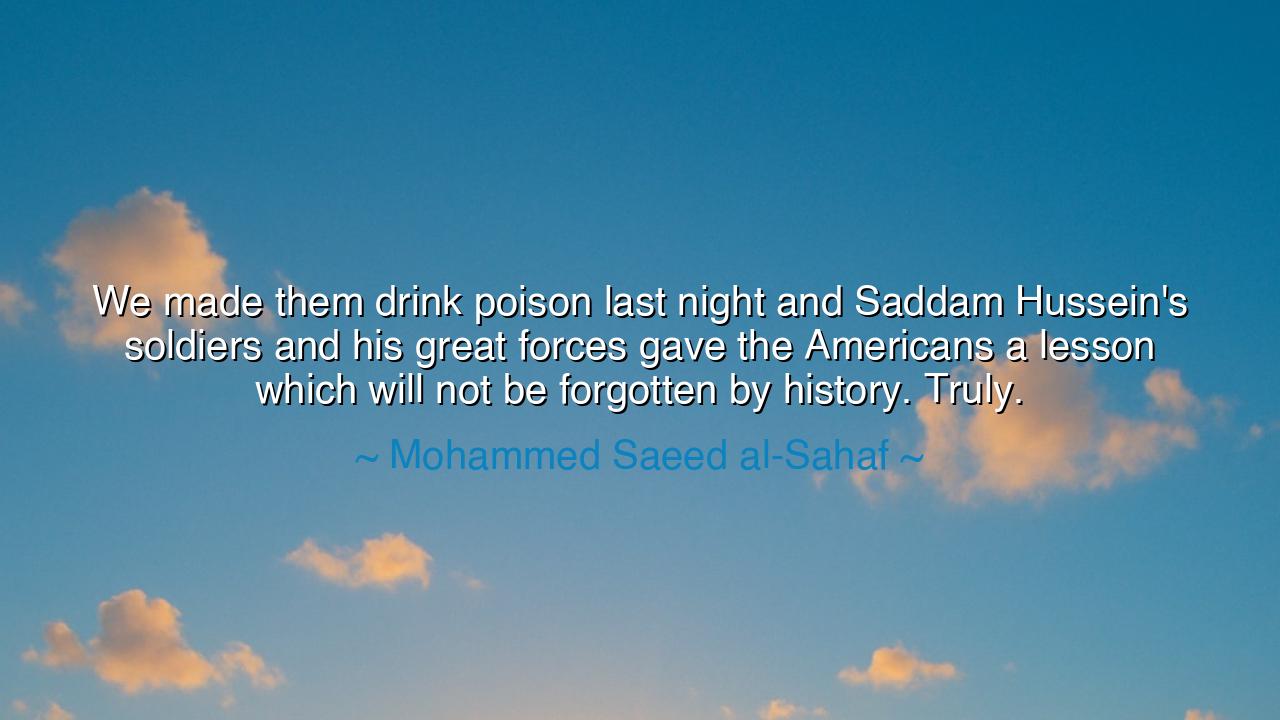
We made them drink poison last night and Saddam Hussein's
We made them drink poison last night and Saddam Hussein's soldiers and his great forces gave the Americans a lesson which will not be forgotten by history. Truly.






“We made them drink poison last night and Saddam Hussein's soldiers and his great forces gave the Americans a lesson which will not be forgotten by history. Truly.” – Mohammed Saeed al-Sahaf
Thus spoke Mohammed Saeed al-Sahaf, the Iraqi Information Minister during the war of 2003 — known to the world as “Baghdad Bob.” His words, fierce and defiant, thundered forth even as the city around him fell. In this quote, he stands as a symbol not merely of denial, but of the human spirit’s desperate need to preserve dignity in the face of ruin. His declaration that the enemy had been made to “drink poison” and that a “lesson will not be forgotten by history” was not truth in the literal sense — for the armies he praised were collapsing — but truth of another kind: the truth of illusion, of pride, of the power of belief even in the hour of defeat.
To understand his words, we must return to their origin, to the days when Baghdad trembled under the roar of invasion. The world watched as the armies of the United States swept through Iraq with overwhelming might. Yet, each day, al-Sahaf appeared before the cameras, his voice unwavering, his words majestic in confidence. “There are no American troops in Baghdad,” he declared, even as the rumble of their tanks could be heard behind him. “We made them drink poison,” he proclaimed, as the horizon burned. To many, his words became a farce — a performance of denial. But to those who listened deeply, they revealed something more ancient: the refusal of the defeated to surrender the soul, even when the body of the nation is broken.
This, too, is a story told throughout history. When the city of Troy burned, the poet Homer wrote of its defenders who spoke of victory even as the gates fell. When the last emperor of Byzantium, Constantine XI, faced the invading Ottomans, he rode into battle wearing his royal armor, declaring that the empire would never fall. When the warriors of the Aztec empire saw their gods silenced by foreign steel, they still sang songs of triumph to the heavens. In every age, those standing upon the edge of annihilation have spoken as al-Sahaf did — not to deceive others, but to preserve the story of courage. For when all else is lost, the human heart clings to words, to belief, to defiance.
In this way, al-Sahaf’s quote becomes a mirror reflecting the paradox of war and pride. His claim that Saddam’s soldiers “gave the Americans a lesson” was not a report — it was an act of psychological survival. He sought to rewrite reality through speech, as though language could shield his people from despair. The ancients understood this power of the spoken word. The Egyptian scribes believed that to name something was to give it life. So too did al-Sahaf seek to breathe life into a dying vision — to keep the spirit of resistance alive through the poetry of propaganda. It was tragic, yes, but also profoundly human.
And yet, his words also warn us of the danger that lies within denial. For when pride blinds the eyes of leaders, nations suffer. History is filled with rulers who refused to see the truth of their downfall — emperors who fought phantom victories, generals who mistook arrogance for courage. To deny reality is to build one’s house upon sand; the tide of truth will always rise to sweep it away. Al-Sahaf’s speeches became a spectacle for the world, a lesson not of military might, but of the futility of illusion. His “poison” was not swallowed by his enemies, but by his own people, who were fed lies in the hope that they might believe in a victory that would never come.
Yet even in this, there is something to be learned. Words are weapons, as powerful as swords — they can lift nations or deceive them. They can preserve hope or destroy trust. Al-Sahaf’s tale is not one of mockery, but of caution: that truth must not be forsaken, even in moments of fear. The wise leader speaks not only to comfort his people, but to guide them with clarity. For the courage to face defeat is greater than the delusion of false triumph.
So, my child of the future, take this teaching into your heart: do not seek comfort in denial, nor victory in illusion. Stand in truth, even when it burns. When your world trembles, speak with honesty, for truth is the only fortress that cannot fall. The story of Mohammed Saeed al-Sahaf is not merely one of propaganda or pride — it is the story of humanity’s eternal struggle between appearance and reality, between hope and honesty. Learn from his words, but also from their collapse. For history remembers not those who boast of victory, but those who face truth and rise again.






AAdministratorAdministrator
Welcome, honored guests. Please leave a comment, we will respond soon